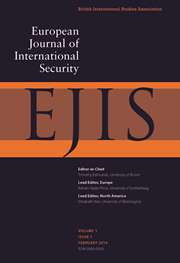 Today the first issue of the brand new European Journal of International Security (EJIS) went online.
Today the first issue of the brand new European Journal of International Security (EJIS) went online.
EJIS is the new flagship journal of the British International Studies Association published with Cambridge University Press. The editorial team consists of colleagues from the GW4, with Tim Edmunds (Bristol) in the lead. Together we have been working for a year to get the journal up and running.
As we highlight in our editorial statement:
We launch at what is an exciting and challenging time for international security studies. It is exciting because the discipline is vibrant, diverse and growing. Theoretically, the past two decades have seen consolidation and innovation. Established traditions of realism and liberalism have proved resilient and adaptive in the face of global change. Constructivism has emerged as an increasingly persuasive and powerful voice in the field. So too have the range of new approaches that fall loosely under the rubric of Critical Security Studies; from critical theory, to feminist and gender theory, postcolonial perspectives, poststructuralism, international political sociology, and securitization theory. Similarly, strategic studies, long unfashionable, is undergoing a renaissance. Promising new innovations, evolutions and perspectives, from practice theory to science and technology studies, also continue to emerge. It is no exaggeration to consider contemporary international security studies to be one of the most powerful engines of theoretical innovation in the discipline of international relations.
Empirically, the field addresses a range of contemporary themes, issues and problems. These include established concerns of inter-state violence and military confrontation, but they also incorporate a range of new (or at least newly emphasized) challenges, including identity-based violence, terrorism, climate change, the spread of potentially transformative technologies, development and security, and everyday experiences of insecurity. These issues are defined both by their pressing importance at the level of policy and experience – to states, international organisations and to ordinary people and communities – as well as by their often inherent uncertainty and dynamic nature. Such an environment presents, demands even, theoretical innovation.
Read the full editorial statement here.
Pingback: First Issue of European Journal of International Security published ... - News4Security